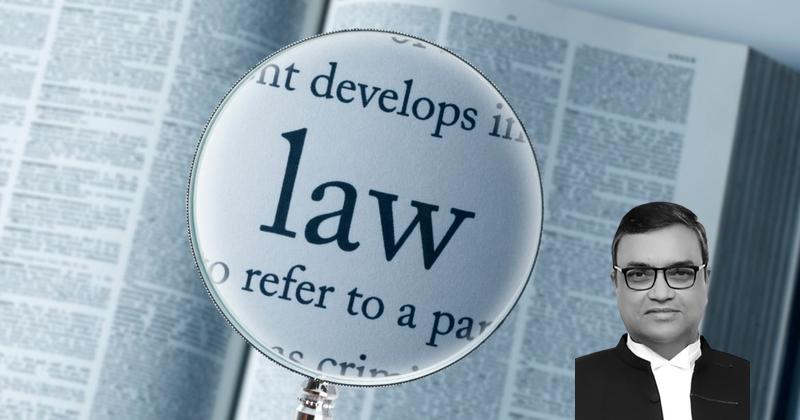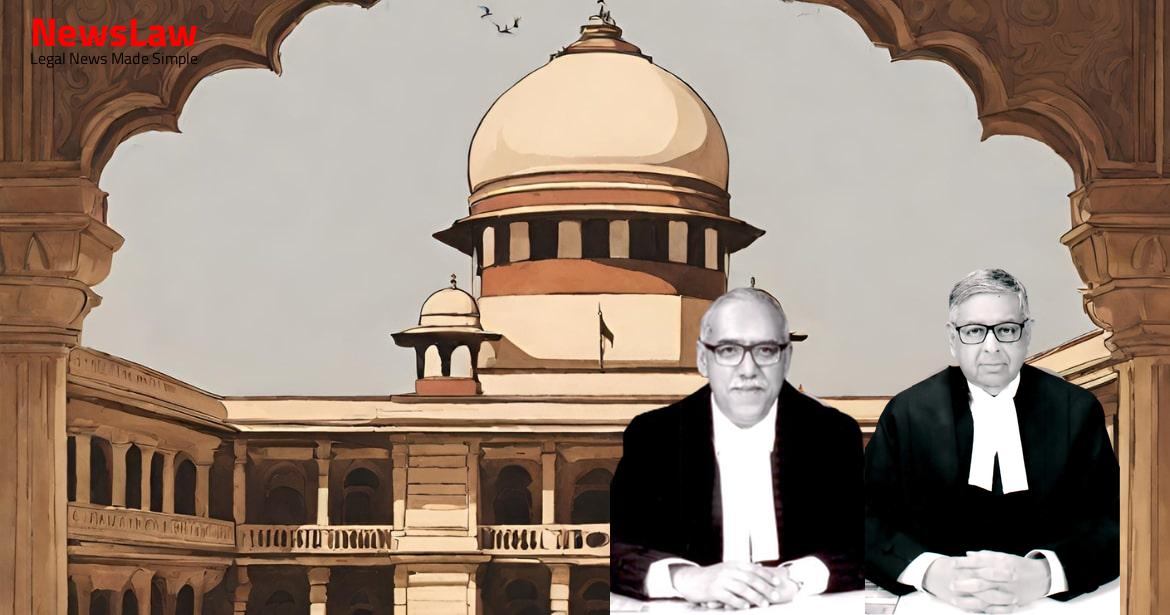The Authorized Officer (for brevity “the Authorized Officer”, hereafter) of the State Bank of India, Stressed Asset Management Branch, Coimbatore, Tamil Nadu (for brevity “the Bank”, hereafter) has impugned the judgment and order dated 27 March, 2018 of the Madras High Court allowing a writ petition (W.P. 30,75,000/- towards 25% of the sale price by RTGS on 15 September, 2017 itself, and was under advice to pay the balance 75% thereof, i.e., Rs. The request of the contesting respondent was rejected by the Authorized Officer by his letter dated 21 October, 2017 and the contesting respondent was advised to make payment of the balance amount on or before 23 October, 2017. Since the contesting respondent did not pay the balance amount of the sale price by 23 October, 2017, the Authorized Officer sent a letter dated 24 October, 2017 to the contesting respondent informing him that the e-auction sale held on 15 September, 2017, which was concluded in his favour, stands cancelled and that the amount of Rs.
The contesting respondent having come to learn of such notice filed an interim application before the DRT seeking stay of the auction; however, by an order dated 3 January, 2018, the DRT dismissed the application relying on the interim order of the DRAT dated 12 December, 2017 but granted liberty to the contesting respondent to participate in the e- auction proposed to be held on 5 January, 2018. 1,23,00,000/- to another auction purchaser, which was the same amount quoted by the contesting respondent, the Bank “should not be permitted to enrich by forfeiting the amount from the writ petitioner and simultaneously appropriate the sale proceeds from the highest bidder in the auction sale notice dated 15.12.2017”. He further contended that prior to 31 October, 2017, no order of stay passed by the DRT was subsisting and there was absolutely no reason for the contesting respondent, if he was genuinely interested in closing the deal, to deposit the balance amount of sale price while at the same time reserving his right to claim the entire amount deposited, if the sale did not fructify. Per contra, counsel for the contesting respondent sought to impress upon us that the order directing refund was passed on a concession made by counsel for the first respondent before the High Court, i.e., the Authorized Officer; hence, the appeal was not maintainable. He also contended that there has to be an overall consideration of the facts and circumstances obtaining in the case which led the contesting respondent to reasonably believe that pendency of proceedings before the DRT at the instance of Stallion would result in the entire sale price, if deposited, being blocked. At the outset, we reject the contention of the contesting respondent that the High Court, based on concession of counsel for the Authorized Officer, proceeded to pass the order for refund.
The same read as under: “(2) The sale shall be confirmed in favour of the purchaser who has offered the highest sale price in his bid or tender or quotation or offer to the authorised officer and shall be subject to confirmation by the secured creditor: Provided that no sale under this rule shall be confirmed, if the amount offered by sale price is less than the reserve price, specified under sub-rule (5) of rule 8: Provided further that if the authorised officer fails to obtain a price higher than the reserve price, he may, with the consent of the borrower and the secured creditor effect the sale at such price. (5) In default of payment within the period mentioned in sub-rule (4), the deposit shall be forfeited [to the secured creditor] and the property shall be resold and the defaulting purchaser shall forfeit all claim to the property or to any part of the sum for which it may be subsequently sold.” Bare perusal of the aforesaid provisions reveals an ordainment in sub-rule (4) that on mutual agreement, the time for making deposit of the balance amount of sale price can be extended for a period not exceeding ninety days; but, extension beyond ninety days is not permissible on any count. If, however, circumstances are shown to exist where a bidder is faced with such a grave disability that he has no other option but to seek extension of time on genuine grounds so as not to exceed the stipulated period of ninety days and the prayer is rejected without due consideration of all facts and circumstances, refusal of the prayer for extension could afford a ground for a judicial review of the decision-making process on valid ground(s).
It may also be noted in this connection that the express power conferred on a secured creditor by sub-rule (5) of rule 9 of the Rules to forfeit the 2021 SCC OnLine SC 3340 initial deposit made by the bidder in case he commits any default in paying installments of the sale price to the secured creditor has been held by this Court in Agarwal Tracom Private Ltd vs Punjab National Bank and Ors. Black’s Law Dictionary, inter alia, explains ‘forfeiture’ as “the loss of a right, privilege, or property because of a crime, breach of obligation, or neglect of duty” or “something (esp. Unless the loss or deprivation of the goods is by way of a penalty or punishment for a crime, offence or breach of engagement it would not come within the definition of forfeiture”.
Though it is true that the power conferred by sub-rule (5) of rule 9 of the Rules ought not to be exercised indiscriminately without having due regard to all relevant facts and circumstances, yet, the said sub-rule ought also not be read in a manner so as to render its existence only on paper. However, what does generally escape notice in the process is that it is the mischievous borrower who steals a march over the secured creditor by managing to have a highly valuable property purchased by one of its henchmen for a song, thus getting such property freed from the clutches of mortgage and by diluting the security cover which the secured creditor had for its loan exposure. However, once a party expresses willingness to enter into a contractual relationship subject to terms and conditions and makes an offer which is accepted but thereafter commits a breach of contract, he does so at his own risk and peril and naturally has to suffer the consequences.
Also Read: https://newslaw.in/supreme-court/appellant-convicted-for-culpable-homicide-not-amounting-to-murder/
It is in such a scenario that provisions of enactments, particularly those provisions which have a direct bearing on the economy of the nation, must receive such interpretation so that it not only fosters economic growth but is also in tune with the intention of the law-makers in introducing a provision such as sub-rule (5) of rule 9, which though harsh in its operation, is intended to suppress the mischief and advance the remedy. At the cost of repetition, it must not be forgotten that the SARFAESI Act was enacted because the general laws were not found to be workable and efficient enough to ensure liquidity of finances and flow of money essential for any healthy and growth-oriented economy. On (2004) 4 SCC 311 the date an order of forfeiture is in contemplation of the authorized officer of the secured creditor for breach committed by the bidder, factually, the position is quite uncertain for the former in that there is neither any guarantee of his receiving bids pursuant to a future sale, much to the satisfaction of the secured creditor, nor is there any gauge to measure the likely loss to be suffered by it (secured creditor) if no bidders were interested to purchase the immovable property.
Sections 73 and 74 of the Contract Act would not, therefore, be sufficient to take care of the interest of the secured creditor in such a case and that also seems to be another reason for bringing in the provision for forfeiture in rule 9. Rule 9(5)
providing for forfeiture is part of the Rules, which have validly been framed in exercise of statutory power conferred by section 38 of the SARFAESI Act. At the same time, section 37 of the SARFAESI Act postulates that provisions thereof or the rules made thereunder shall be in addition to and not in derogation of the enumerated enactments or any other law for the time being in force. The up-shot of the aforesaid discussion is that whenever a challenge is laid to an order of forfeiture made by an authorized officer under sub-rule (5) of rule 9 of the Rules by a bidder, who has failed to deposit the entire sale price within ninety days, the tribunals/courts ought to be extremely reluctant to interfere unless, of course, a very exceptional case for interference is set up. However, in course of such scrutiny, the tribunals/courts must be careful and cautious and direct their attention to examine each case in some depth to locate whether there is likelihood of any hidden interest of the bidder to stall the sale to benefit the defaulting borrower and must, as of necessity, weed out claims of bidders who instead of genuine interest to participate in the auctions do so to rig prices with an agenda to withdraw from the fray post conclusion of the bidding process. In any event, the underlying principle of least intervention by tribunals/courts and the overarching objective of the SARFAESI Act duly complimented by the Rules, which are geared towards efficient and speedy recovery of debts, together with the interpretation of the relevant laws by this Court should not be lost sight of.
Also Read: https://newslaw.in/supreme-court/ownership-dispute-commissioners-order-and-revenue-documents/
The Authorized Officer responded favourably and extended the time for deposit by 25 days as prayed by the contesting respondent, i.e., till 23 October, 2017. The contesting respondent in terms of the statutory ordainment was required to pay the balance amount of sale price on or before 15 days of confirmation of sale. The order of the Authorized Officer dated 24 October, 2017 forfeiting 25% of the sale price was also not challenged by the contesting respondent before the DRT in any independent proceeding; on the contrary, after the DRAT granted permission to the Authorized Officer to conduct sale afresh by its order dated 12 December, 2017 and pursuant whereto a fresh e-auction notice was issued on 18 December, 2017, the contesting respondent had instituted an independent application under section 17(1) of the SARFAESI Act before the DRT and had also filed I.A.
Although it is not always necessary for an auction purchaser to arrange for funds and be ready to pay the entire sale price within 15 days of confirmation of sale, since extension of time is contemplated in rule 9, it is beyond our comprehension why the contesting respondent while applying for an extension of time on 27 September, 2017 sought for only 25 days’ time and not for more time, at least up to the entire period of ninety days, being the maximum time that he could have asked for and made available to him in terms of rule 9(4). It can be inferred from the facts and circumstances that the contesting respondent was seeking to buy time. Many a time, when a sale does not fructify because of an injunction, the time taken and efforts made together with costs incurred by the secured creditor to put up the secured asset (immovable property) for sale once again and close the transaction by itself may result in prejudicial affectation of its interest in enforcement of the security interest.
The circumstances of the case make it imperative to consider the question: when does an enrichment or unjust enrichment occur? The principle of unjust enrichment requires: first, that the defendants has been ‘enriched’ by the receipt of a ‘benefit’; secondly, that this enrichment is ‘at the expense of the plaintiffs’; and thirdly, that the retention of the enrichment be unjust.
Case Title: AUTHORISED OFFICER STATE BANK OF INDIA Vs. C. NATARAJAN (2023 INSC 341)
Case Number: C.A. No.-002545-002545 / 2023



